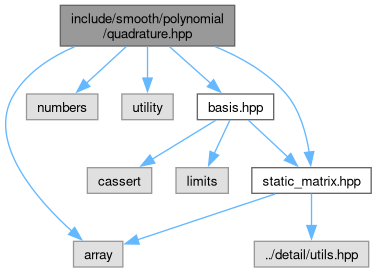Compile-time quadrature scheme generation. More...
#include <array>#include <numbers>#include <utility>#include "basis.hpp"#include "static_matrix.hpp"
Include dependency graph for quadrature.hpp:

Go to the source code of this file.
Functions | |
| template<std::size_t K> | |
| SMOOTH_BEGIN_NAMESPACE constexpr std::array< double, K > | cgr_nodes () |
| Chebyshev-Gauss-Radau nodes on [-1, 1]. | |
| template<std::size_t K, std::size_t I = 8> requires (K <= 40) | |
| constexpr std::pair< std::array< double, K >, std::array< double, K > > | lgr_nodes () |
| Legendre-Gauss-Radau (LGR) nodes and weights on [-1, 1]. | |
Detailed Description
Compile-time quadrature scheme generation.
Definition in file quadrature.hpp.
Function Documentation
◆ cgr_nodes()
template<std::size_t K>
|
constexpr |
Chebyshev-Gauss-Radau nodes on [-1, 1].
- Template Parameters
-
K number of points to generate
Definition at line 58 of file quadrature.hpp.
◆ lgr_nodes()
template<std::size_t K, std::size_t I = 8>
requires (K <= 40)
requires (K <= 40)
|
constexpr |
Legendre-Gauss-Radau (LGR) nodes and weights on [-1, 1].
- Warning
- Only accurate up to approximately K = 40
- Template Parameters
-
K number of points to generate I number of Newton-Rhapson iterations
- Returns
- {xs, ws}
LGR nodes xs are the K roots of
\[ p_{K-1)(t)} + p_K(t), \]
where $p_i$ are Legendre polynomials. This functions obtains the LGR nodes via a fixed number of Newton iterations, using the CGR points as initial guesses.
The weight ws[0] for node 0 is 2 / K^2, for the remaining nodes the weights ws[k] are
\[ w_k = \frac{1}{(1 - x_k) [p_{K-1}(x_k)]^2} \]
Definition at line 88 of file quadrature.hpp.